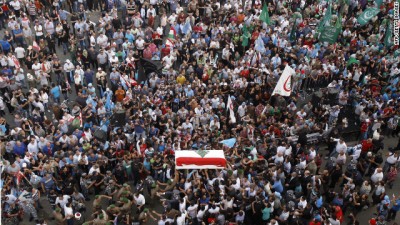 The Obama administration for the first time backed the Lebanese opposition’s call for a new government to be formed in Beirut, following Friday’s killing of a high-ranking Lebanese intelligence official.
The Obama administration for the first time backed the Lebanese opposition’s call for a new government to be formed in Beirut, following Friday’s killing of a high-ranking Lebanese intelligence official.
The State Department’s announcement Tuesday marked a shift by the U.S. and the West, which initially appeared to support Prime Minister Najib Mikati, who came to power last year with the backing of militant Lebanese political party Hezbollah.
U.S. and European officials were initially worried that efforts to replace Mr. Mikati’s government could fuel instability in Lebanon, which is already feeling the effects of civil war in neighboring Syria. Western officials have also criticized divisions in Beirut’s political opposition, called the March 14 movement, which took power following the departure of Syrian troops in 2005 but was unable to effectively rule.
But U.S. and European officials said Tuesday that they believe a managed transition could be achieved. A change in Beirut’s government, they said, could increase pressure on Syrian President Bashar al-Assad, by politically weakening Hezbollah and Damascus’s other close allies in Lebanon. Any changes that lessen Hezbollah’s political power would be a victory for the U.S. in its regional competition with Iran, Hezbollah’s chief financial backer and arms supplier. A new government could also help prepare for new Lebanese legislative elections in May, these officials said.
“We…are not going to prejudge the outcome of any moves to establish a new governing coalition. This is obviously a Lebanese affair,” State Department spokeswoman Victoria Nuland said Tuesday. “And while we don’t want a vacuum of a legitimate political authority, we do support this process that is now under way to produce a new government that’s responsive to the needs of the Lebanese people.”
Hezbollah has widened its influence in Lebanon’s government since 2005.
“They have been quiet for a while, because they believe they have the government and they will let not go of it easily. But after a while, something will have to give,” said Ahmad Fatfat, a member of parliament with the March 14 coalition.

Friday’s killing of intelligence chief Brig. Gen. Wissam al-Hassan in a downtown Beirut bombing has fueled violent protests in Lebanon and accusations that Mr. Mikati failed to adequately establish security in the country.
Opposition officials have widely charged Mr. Assad’s government with orchestrating the killing of Gen. Hassan, who was seen as a fierce opponent of Syrian influence inside Beirut.
Gen. Hassan, a Sunni Muslim, had closely cooperated with the international tribunal investigating the 2005 murder of former Lebanese Prime Minister Rafik Hariri, which eventually indicted four members of the Shiite Hezbollah. The intelligence chief also led an investigation this year into a pro-Syrian politician who was arrested for allegedly plotting a bombing campaign inside Lebanon.
Syria and Hezbollah have denied any role in Mr. Hariri’s murder or the alleged bombing plot.
Details released Tuesday by Lebanon’s police chief on the investigation into Friday’s bombing show a carefully planned car bomb in which the perpetrators appeared to closely track Gen. Hassan, who had secretly returned to Lebanon from France less than 24 hours before he was killed.
The intelligence chief had a meeting in the area to discuss text-message threats that several anti-Syrian lawmakers had received, Mr. Fatfat and other parliamentarians said.
Former Prime Minister Saad Hariri—who is the son of Rafik Hariri, the prime minister slain in 2005—has been among the leading March 14 voices calling for a change in government. Lebanese President Michel Suleiman has been holding meetings with Beirut politicians in recent days to find a way out of the political crisis.
Mr. Suleiman turned down a offer by Mr. Mikati on Saturday to resign following the bombing that killed Gen. Hassan.
Arab and U.S. officials said they expected a continued effort led by Mr. Suleiman to forge a transitional government in Lebanon leading to elections in May. Among the possibilities these officials cited would be a government made up of technocrats and senior statesmen. There is also discussion of establishing a “national salvation” government, they said.
“Suleiman has a very important role to play here. But there needs to be some moves from the opposition, too,” said a Western official involved in the diplomacy. “It’s going to be a very complicated, uneven process.”
U.S. and European officials wouldn’t rule out Mr. Mikati potentially surviving in a new government. The Sunni politician and businessman from the northern Lebanese city of Tripoli has received relatively high marks in Washington and Brussels for navigating Lebanon through the instability created by Syria’s civil war. Roughly 100,000 Syrians have sought refuge in Lebanon.
The State Department’s announcement Tuesday marked a U-turn from the West’s position.
In recent days, European ambassadors met with Mr. Suleiman and Mr. Mikati and warned them against allowing a power vacuum. On Monday, the State Department declined to take a position on the prime minister’s future following a phone call on Sunday between Secretary of State Hillary Clinton and Mr. Suleiman.
The U.S. has sent a team from the Federal Bureau of Investigation to assist Lebanese police in probing Gen. Hassan’s killing.
WSJ
Top Photo: Scene of the assassination of Lebanon intelligence chief Brig. Gen. Wissam al-Hassan in a downtown Beirut bombing . His murder has fueled violent protests in Lebanon and accusations that PM Nagib Mikati failed to adequately establish security in the country. Even though Syrian president Bashar al Assad was blamed for his assassination, many analysts in Lebanon believe that Hezbollah which controls the government executed Hassan’s killing.

Leave a Reply
You must be logged in to post a comment.